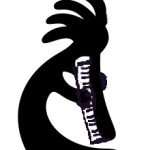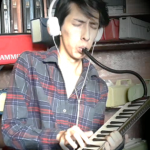Improving the perception of the melodica
- This topic has 22 replies, 10 voices, and was last updated 5 years, 8 months ago by
 Alan Brinton.
Alan Brinton.
-
AuthorPosts
-
August 6, 2018 at 3:10 pm #10139
 KevinParticipant
KevinParticipantI’m going to take Gianluca’s suggestion of starting a new thread from the Melodica Men thread and run with it:
In your opinion, what should we do and/or what things are still missing to improve the perception of the melodica as a “regular” instrument?As I’ve written before I think it’s going to take a real break-out melodica star.
Any of the “celebrity” performers that use a melodica John Batiste is probably the most visible right now.
They all use the melodica as an addendum to their role as a keyboardist. Often it’s used in a novelty number or unplugged segment of a show.
Until there’s a player who walks on stage with only a melodica with the sort of confidence a Miles Davis or John Coltrane had leading their own band I think it’s always going to be another keyboard but not the primary one.In the classical vein there are some things I could visualize us(or someone) doing but it would take bringing up the ugly word money!
One would be commissioning a known composer to write a piece or pieces for melodica. Or conversely sponsoring an open melodica composition competition. Getting an orchestra or music hall to program their performance would be another matter.
Another thing would be setting up a scholarship at a respected music school or conservatory for a student who would make melodica their major instrument.
Third, by watching YouTube I can tell there’s some sort of melodica festival in Japan. Sponsored by Suzuki I think?
It would be great if someday we could have Melodicaworld sponsor or co-sponsor a melodica festival in the U.S. or Europe.That’s all the ideas I’ve got right now. Anybody else?
August 6, 2018 at 3:31 pm #10142 Luis melodionParticipant
Luis melodionParticipantHi bro, what you say is very interesting
As you say, I suppose we have to compose more pieces in which our instrument is the protagonist.I think a festival is possible in the US or in Europe, especially in the US, because of what I’ve seen, the people of that country have big events on almost any topic. 🙂
However, in my country I do not think that is possible, at least for a long time, in my conservatory they laugh at me for playing the melodic because at least in Mexico the higher music schools are still very closed in their thinking, I do not know other countries but I suppose that the face that the teachers put on when they hear the word “Melodica” must be something similar:I hope brands like Hohner, Suzuki and Yamaha will take a look at this forum and take all our opinions into account. 🙂
Good luck and if I can help you, contact me.August 6, 2018 at 5:11 pm #10145 Alan BrintonParticipant
Alan BrintonParticipantI believe significant progress has been made on several fronts over the past eight years or so. Search “melodica” on You Tube and compare what you get with what you were getting five years ago. It used to be almost all musical junk by rank amateurs. Today, serious performances by talented musicians are fairly common, and they are getting the Internet hits.
See what has been going on in Japan, where many talented players, many of them two-handed players are playing in groups, participating in public concerts, with skillful players mentoring promising students, and consciously pursuing an agenda of securing recognition for the keyboard harmonica as a serious musical instrument — in a country in which it’s roots have been mainly in the education of young children.
I was somewhat in agreement with the comment you made about the need for a super star, Kevin, but now I think something better has happened, namely the emergence of professional musicians who are focusing their attention on the melodica and producing really classy audio and video recordings, as illustrated by, for example, those recently posted in our Members Recordings forum.
Melodica World has, in my opinion, been a contributing factor, with its unique culture and its truly international mix of members, its openness to all musical genres, and the support and inspiration it offers for all levels of players. It’s great that musicians who have recently noticed the melodica want to be part of this community.
Let’s also reflect on the work of some of our own longstanding musical professionals who have been pursuing interesting and productive agendas with the melodica. No need to mention their names.
I’m not convinced that an emphasis on composition for the melodica is the way to go. It’s fine and should not be discouraged. Perhaps it makes more sense in the classical tradition. But it can sometimes seem to be predicated on the perception of the instrument being a novelty instrument. It can also raise the bar in relation to the quality of the composition.
August 6, 2018 at 7:26 pm #10146 KevinParticipant
KevinParticipant“…compare what you get with what you were getting five years ago. It used to be almost all musical junk by rank amateurs.”
Ha,ha,ha Alan. My video was posted five years ago! ;p
I didn’t mean to diminish the contributions and accomplishments of our fellow forum members in any way.
Yes, I think we are adding to the changing perception of our instrument but there is room for improvement.
I was thinking of recently we had a new hire at work that asked me. “I hear that you make music?”
Before I could respond a co-worker who has been here a few years blurted out with a smirk on her face, “He plays weird instruments!”
Or a girlfriend who said ” I was watching TV last night and saw a guy playing one of those devices you play.”
In calling for compositions I was modeling Andres Segovia’s goals he set for the guitar:
At the beginning of his career Segovia had set himself four aims: “To redeem the guitar from flamenco and other folkloric amusements, to persuade composers to create new works, to show the real beauty of the classical guitar and to influence schools of music and conservatories to teach guitar at the same dignified level as the piano, violin and cello”
Replace guitar with melodica and the phrase “flamenco and other folkloric amusements” to “being thought of as a toy or only for schoolchildren” and I don’t think those are bad goals.August 6, 2018 at 8:07 pm #10147 Alan BrintonParticipant
Alan BrintonParticipantYour video is not one of the ones I had in mind, Kevin!
August 6, 2018 at 10:58 pm #10148 Nathan de Broize-KingParticipant
Nathan de Broize-KingParticipantI think this is a really interesting and important discussion. Ill soon be handing in my masters research on this subject along with pieces of music showing how expressive the melodica can be as an instrument (including notation showing specific techniques).
In the UK there is also a grade syllabus which includes the melodica but only up to grade 3. My aim this year is to get involved with the syllabus and expand it if possible. Compositions for the melodica on the syllabus are not specific to the instrument though sadly. You could pick up the grade pieces and play them on violin or flute.
Id like to hear peoples thoughts on improving the perception of the melodica…
August 7, 2018 at 6:08 am #10150 Melodica-MeParticipant
Melodica-MeParticipantHere is my two cents on this subject. I believe that Melodica acceptance by the masses will come by way of the superstar performer that will be daring enough to try something different. It will not come by way of classical, Jazz or tradidional music performers but by the likes of performers like Bruno Mars, Beyonce, Arian Grande etc. When this happens all the naysayers will jump on the Melodica band wagon. Performers like Jon Batiste or your favorite unknown indie band do not have the comercial pop music pull to make the kind of statement that will draw acceptance to our beloved melodica. Yes there have been many artist that have used the melodica on recordings but to date, I cannot think of a number one hit in the pop charts that the melodica was used and that made a memorable impact to the production. It will come, the more the melodica is shared on You tube, Facebook, Instagram and Twitter, major performers will take notice and incorporate the melodica into their productions. So keep uploading your videos and always do your best to show that the melodica is a professional instrument with endless possibilities.
Melodica-MeAugust 7, 2018 at 8:27 am #10153 Gianluca BarbaroParticipant
Gianluca BarbaroParticipantThank you Kevin for starting this thread!
Although I can follow the reasoning behind it, I’m not sure a “superstar” melodica player would change much: in my experience, people tend to classify excellent players under the “virtuoso” category, like it’s just a matter of talent and not so much of hard work/quality of the instrument in itself.
I’m currently involved in the publishing of some didactic textbooks (mainly for my local students) so a question raises naturally in my mind: what about specific methods and/or technical materials for the melodica? There’s not much around, afaik… Do you think that is an issue in the perception of the instrument?August 7, 2018 at 1:04 pm #10154 Joanna FunkParticipant
Joanna FunkParticipantA few years ago I played my Suzuki Pro 37 in a musical and people approached me in the car park afterwards to ask the name of that “lovely” instrument. These melodicas don’t look or sound like toy instruments. I love my recently acquired Hammond 44H and am serious about playing it as well as I can and letting people hear it. But I have to confess that I also LIKE having an uncommon instrument! When I mention I own a melodica, someone might say to me, “A melodica? You mean those things with a tube that you blow into and press little piano keys?” I just smile and say, “You WAIT till you hear mine.” And I like that, surprising people with our melodicas which look and sound beautiful. By the way, this website is so educational, and the opinions shared are just great. I feel privileged to be a melodica owner and part of this community. Makes me want to get better and better. Cheers.
August 7, 2018 at 5:51 pm #10155Ricky
ParticipantGianluca wrote: “people tend to classify excellent players under the “virtuoso” category, like it’s just a matter of talent and not so much of hard work/quality of the instrument in itself.”
Man, this is so true. Folks mean it as a compliment when they call us talented. Unfortunately, by doing so, they disregard the work we put into learning to play an instrument. I think the concept of talent is too broad. I know there is physical talent, sure. But so much of what folks describe as talent is just the product of hard work.
Ellen Langer, a professor at Harvard, has studied “talent” and her conclusions are similar. Also Malcom Gladwell’s book “Outliers” points out the work that goes into becoming what folks describe as “Talented.”
As a pianist I’ve often told people that my true talent is the ability to sit on the bench for sustained periods of time. They usually look at me like I’m nuts. But maybe that in itself is a talent!
Great thread. Thanks folks. RM
August 8, 2018 at 1:50 pm #10156 Alan BrintonParticipant
Alan BrintonParticipantI’m not keen on having a superstar who is not much of a musician and just jumps around the stage waving a melodica, though that will get lots of people to go out and buy one.
August 8, 2018 at 2:17 pm #10157 DarenKeymaster
DarenKeymasterThis is such an interesting topic. I think there’s several reasons the melodica isn’t perceived as a serious instrument.
* Many people have only ever heard a melodica being played crudely by an amateur or young child, and always associate that sound with the instrument
* Most melodicas you hear in an ensemble are quite out of tune, and grate with the other instruments
* Even when you tune your melodica, its virtually impossible to achieve any true consistency because of moisture build-up, causing random deviations, and a drop in pitch within the first few minutes of playing
* Most melodicas look like toys, or at their best, cheap plastic objects. I’d include the ‘higher end’ models out there – to me they still don’t compare to any other acoustic instrument. Even the cheapest £50 violin is made of wood!
* It only makes use of one hand. The melodica is generally played with the right hand, leaving the left redundant. This makes it appear an “easy” instrument to play. There are of course some exceptions, breaking the mold, and maximising performance capabilities with both hands.
I like the idea of new composition for melodica, but unfortunately there’s already a lot of unperformed compositions out there. Not all for melodica, but the hard thing for contemporary composers is actually getting their works performed. Though as Kevin says, commissioning a well known composer could help, especially if there’s available funds for a tour and recording.
A superstar melodica performer? I think it would make a huge difference. Maybe that person is reading this thread right now, melodica in hand, determined to put the work in.
I think its too early for conservatoires, but would be great to be part of that tradition at some point. I think we’re still in the initial phases. Remember this instrument was only invented 60 years ago. Maybe in the future, once there’re several virtuosos and teachers out there, some good quality instruments, and a body of work to perform
I play a wooden-bodied melodica in small concerts. Like Joanna, I get people coming to me asking what this amazing instrument is. So many people have never seen one before. Although I made the wooden body as part of my experiments with melodica building, the look of it goes a long way towards being accepted by other musicians. I also play it in commercial recordings for television etc. It is considered eccentric by the studio staff, and interestingly, nearly always described as either a harmonica, accordion or concertina in any sleeve notes, so as not to put TV editors off using it!
I do think the internet’s having a positive effect. As Alan says, the videos are getting better. There’s a clear movement of musicians around the world, who are taking the instrument seriously, many of them in Japan. And recently there’s been a lovely wave of very credible recordings turning up here, which I’ve really enjoyed listening to.
I’d love to see Bjork make use of it, I think I could do an amazing collaboration with her 🙂
August 9, 2018 at 8:17 am #10158 Melodica-MeParticipant
Melodica-MeParticipantIn my two cents I should have clarified that when I mentioned the use of the melodica by a superstar, I was referring the use of the melodica in their production, though it would be great if a superstar performer would play one. The main goal we all have is to have our melodica considered a professional instrument and not just a toy. The more the melodica is heard or seen in any type of media, the more the melodica will become a common instrument and accepted. One has to consider that even instruments like Oboe, Bassoon or the Barritone which are professional instrument and used in many types of music, are not a popular instrument to the non musician and even some professional musicians that never played in an orchestra. If we are only seeking acceptance from our piers, then we must educate those in academia and production to the endless possibilities of the melodica. In my experience, the non musician has always been more intrigued and interested in the melodica than the professional musician. It always gives me a smile when I mention to new musicians I meet that I play the melodica, of course after they roll their eyes and hear the silly chuckle, how after they hear it, they almost always ask me “Hey man, where did you get that” it’s only time.
Melodica-MeAugust 9, 2018 at 2:11 pm #10159 Alan BrintonParticipant
Alan BrintonParticipantPerceptive comments, Melodica-Me. When a musician on stage pulls out a melodica for an occasional number, it always gets a rise from the audience.
I am not a professional musician, nor even a performer, though occasionally I get to play with one informally. I may be the only member here who identifies as an “intermediate” player in my profile. By profession I’m an academic philosopher. On questions such as this one, I’m inclined to defer to professionals. But there is one comment I made earlier to which I’d like to return, which was an expression of skepticism about the distinction between what is and what isn’t a “real” musical instrument.
One source of my doubt is Hermeto Pascoal, for whom everything is a musical instrument — a glass of beer, a pool of water, even his own beard. He seems oblivious to the distinction, or maybe he’s mocking it. We know Hermeto is a serious professional musician and composer. My other source of doubt is folk traditions and the music of indigenous and other relatively isolated cultures, in which, while there may be something akin to our professional musicians (as distinguished from popular musicians), everybody learns to sing and/or play an instrument, and performance anxiety as we know it seems hardly to exist. Here in the U.S., we all know about the music of Appalachia, and we should know more about the musical cultures of our indigenous peoples. My thinking has also been influenced by Kenny Werner’s book, Effortless Mastery, which I read when I first took up the melodica, and also by a recent visit to the Musical Instrument Museum in Phoenix.
None of this is meant to undercut or diminish the very real concerns that members are addressing in this thread, which have to do with respectability and recognition of our instrument. We all know that Hermeto’s beard or a cross-cut saw isn’t quite the same kind of thing as a piano or a violin. Still, when the Creation was completed and Adam named the birds of the sky, he didn’t name the musical instruments. Musical instruments are created, to be sure, but what makes something a musical instrument is its intended or actual use. To follow up on one of Oscar’s points, I’m confident that the actual use of the melodica as a “serious” or “real” musical instrument is what will make it one.
August 9, 2018 at 11:32 pm #10160 KevinParticipant
KevinParticipant“Thank you Kevin for starting this thread!”
Thank-You Gianluca for not being offended that I hijacked your suggestion 🙂 -
AuthorPosts
- You must be logged in to reply to this topic.
